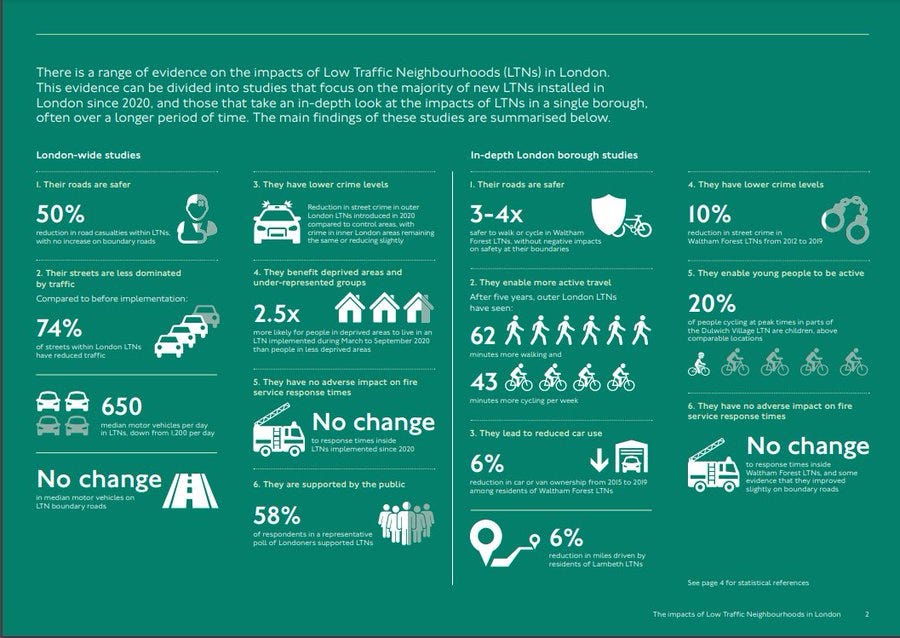#BikeIsBest Advocacy Digest - Edition No. 128
Hello and welcome to this week, when Britain is riding high on the cycling success of its Olympic champions, Emma Finucane, Sophie Capewell and Katy Marchant breaking the World Record and winning Gold
SPORT AND EVERYDAY CYCLING…MADE IN BRITAIN?
Sport and everyday cycling are linked: just look at the post-2012 bike boom. But to maintain that boom you need continued investment in safe routes, so those new riders aren’t put off by a scary experience. The current post-Covid cycling slump reflects how far we have to go to translate short-term interest to everyday cycling, but there are pockets of hope.
BIG STORIES FOR CYCLING ADVOCACY
WHAT ADULTS GAIN WHEN KIDS PLAY IN THE STREET. This heartwarming and inspiring Atlantic piece details the struggles, and findings, of play campaigners and academic research on what happens when kids play in the street. The author argues adults, not just kids, lose out when streets are dominated by cars. Play is scheduled and contained, rather than spontaneous, and the local connections kids facilitate are lost. Those connections, however, can be remade.
CARGO BIKE CHALLENGE. One busy mum has switched her car for a cargo bike commute, for the school run and work. The experiment took place in Sydney’s winter, but Carly Earl reports enjoying ‘having it all’ thanks to the bike - coffee and a peaceful commute, and the kids enjoyed the ride (at least the one old enough to show an opinion). Not only that, it was quicker. Only the coldest days partially defeated the experiment. An Aussie cargo bike hire scheme made it possible.
ENGLAND CAN DO GOOD CYCLEWAYS. Journalist Carlton Reid is travelling around the UK working out some of the best rides the country has to offer. On his way he’s cycled what has been called Britain’s best cycleway, a nine mile, ‘butter smooth’ cycle track from Polegate to Lewes. The route, built by National Highways, is a great example of what’s possible: a behind-the-hedgerow, international standard cycleway that’s benefiting local commuters, and health and tourism besides.
MORE LTNS FOR LONDON. Sadiq Khan has announced funding for up to 30 new Low Traffic Neighbourhoods for London, the Evening Standard reports. The money will go towards developing the traffic-reduction measures, as part of a citywide cycleway system that relies on quiet neighbourhood streets for many sections. Research shows traffic is largely not displaced onto boundary roads, and road casualties decline in LTNs.
BETTER LONDON-PARIS CYCLE ROUTE? Laura Laker has been bashing her way through brambles to look at a proposed improved route for the iconic Avenue Verte, linking London-Paris. Currently the English side needs work, she argues, and one dedicated campaigner wants to reroute it entirely, taking in flatter, more historic, parts of England - to match the iconic, and well-used French section of the route.
OTHER HEADLINES
LISBON SPENDING PARKING FINES ON MOBILITY. The Portuguese capital will allocate 100% of parking fine revenues to walking, cycling and public transport, after a unanimous council vote last week. Anyone blocking pavements in Lisbon will now help fund better and more accessible pavements, among other things. At the moment 55% of fines go back to the city, but a legislative change means fines can stay within the city, to improve public and active transport. Which seems fair.
INTERESTING GRAPH OF THE WEEK:
LTNS WORK. Low Traffic Neighbourhoods improve road safety, reduce crime, reduce traffic (with no net increase on boundary roads), and do not impact fire service response times, according to research. And they are supported by the majority of people. Source: https://content.tfl.gov.uk/tfl-impacts-of-low-traffic-neighbourhoods-feb-2024-acc.pdf
ACTIVE TRAVEL WORD OF THE WEEK:
Enabling. Different from encouraging, enabling someone to, say, walk or cycle more, means helping identifying and removing barriers, or equipping someone with the skills they need to do it. We need more enabling.
Until next time,
Adam Tranter
#BikeIsBest





